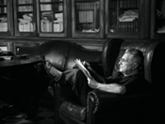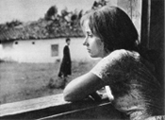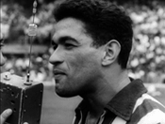In the frenzy of festival coverage, a few noteworthy films always seem to slip through the cracks, and for me, this was the case with Joaquim Pedro de Andrade’s short film, O Aleijadinho, screened during the filmmaker’s retrospective sidebar at the 2007 New York Film Festival. In hindsight, the film intriguingly prefigures Hiroshi Teshigahara’s Antonio […]
Tag: Brazilian Cinema
Macunaíma, 1969
In an early episode of Joaquim Pedro de Andrade’s delirious, bawdy, idiosyncratically fragmented, and bluntly allegorical film, Macunaíma, the eponymous hero, having been abandoned by his impoverished family in the forest, encounters an ogre who then proceeds to placate the hungry child by feeding him a piece of flesh carved from his own leg – […]
The Master of Apipucos, 1959
Originally conceived as an installment in a two-panel portrait of prominent Brazilian intellectuals (and family friends), Joaquim Pedro de Andrade’s The Master of Apipucos captures a day in the life of author and sociologist, Gilberto Freire whose highly influential book, The Masters and the Slaves examined the unique essence of Brazilian identity through the framework […]
The Priest and the Girl, 1965
Marking Joaquim Pedro de Andrade’s first feature film, The Priest and the Girl hews closer to naturalism than modernism in its stark and muted Emile Zola-like tale of a young priest (Paulo José) who has been summoned to a small rural village in Minas Gerais in order to dispense extreme unction for the town’s terminally […]
Brasilia, Contradictions of a New City, 1967
Commissioned by Italian typewriter manufacturing company Olivetti in 1966 to showcase the construction of Brazil’s newly completed modern capital, Brasilia (and who then promptly shelved the completed work, perhaps because of its implicit critical inquiry), Joaquim Pedro de Andrade’s exquisitely shot, articulate, and impassioned film, Brasilia, Contradictions of a New City, as its name suggests, […]
Garrincha, Joy of the People, 1962
Something like a kindred spirit to Hiroshi Teshigahara’s José Torres in its mundane observations of the dedicated craft and everyday rituals of a champion sportsman, Garrincha, Joy of the People is an affectionately rendered and thoughtful, if somewhat idealized portrait of Manoel Francisco dos Santos, affectionately called “Garrincha”, the Brazilian football star considered to be […]





